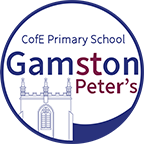History
Gamston St Peter's CofE Primary School History Curriculum
At Gamston St Peter's CofE Primary School, our History curriculum is designed to be accessible to all pupils, maximising outcomes so that they know more, remember more, and understand more. Through a thoughtful and engaging approach, we aim to inspire a deep appreciation for the past and its relevance to the present.
Curriculum Overview
Our History curriculum aims to:
-
Enhance Historical Skills and Knowledge: Equip pupils with the skills, concepts, and knowledge necessary to engage with historical content critically and thoughtfully.
-
Contextual Understanding: Foster an understanding of the present by exploring the past, helping pupils make connections between historical events and contemporary issues.
-
Develop Inquiry and Analytical Skills: Encourage pupils to develop and utilise skills in enquiry, analysis, evaluation, and argument, enabling them to construct well-informed historical narratives.
-
Ignite Curiosity and Motivation: Cultivate a genuine interest in history, motivating pupils to explore and learn about the past in meaningful ways.
-
Foster a Sense of Identity: Help pupils develop a sense of identity through learning about their own history and the histories of others, promoting empathy and understanding.
Intent
Our goals for the History curriculum include:
-
Comprehensive Knowledge Development: Ensure pupils gain a coherent understanding of Britain’s past and the wider world, fostering a curiosity to know more about historical events and figures.
-
Skill Acquisition: Develop key historical skills that allow pupils to ask perceptive questions, think critically, weigh evidence, and discern different interpretations of the past.
-
Cultural Awareness: Promote an understanding of the diversity of societies and relationships between different groups, helping pupils appreciate the complexity of human experiences.
By the end of their time at Gamston St Peter's CofE Primary School, pupils will possess a well-rounded understanding of history, preparing them to engage thoughtfully with the world around them.
Implementation
Our History curriculum is structured around the National Curriculum and is guided by best practises from reputable sources. Key elements include:
-
Long-Term Planning: We utilise Subject Key Learning and Progression in Skills grids to develop comprehensive long-term planning, ensuring a coherent and progressive learning journey.
-
Unit Planning: Teachers use long-term planning to design units of work and deliver individual lessons that are engaging and relevant to pupils’ interests.
-
Guided Curriculum Planning: To ensure that teaching sequences build on pupils' existing subject knowledge and skills, we use Schemes of Work from Key Stage History and The Historical Association to guide our curriculum planning.
Impact
The impact of our History curriculum is evident in various ways:
-
Enhanced Historical Understanding: Pupils will demonstrate a comprehensive understanding of significant historical events, figures, and themes, contributing to their overall knowledge base.
-
Increased Engagement: Our curriculum fosters a positive attitude towards history, encouraging pupils to appreciate the significance of their learning in real-world contexts.
-
Holistic Development: By integrating history across the curriculum, we ensure that pupils can apply their learning in various contexts, enhancing their overall educational experience.
Through a variety of enriching experiences, including well-structured history lessons and community engagement, our pupils will be prepared to thrive in an increasingly complex and interconnected world.
